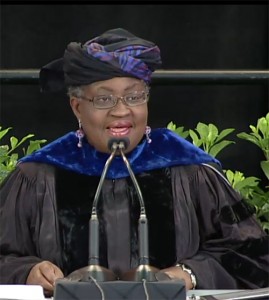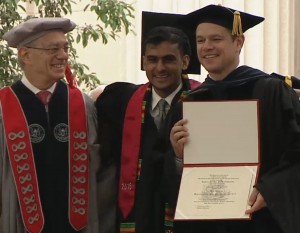Matt Damon, Ngozi Okonjo-Iweala Bring It to MIT
-
-
slice.mit.edu
- 1
Filed Under
Recommended
Commencement speaker Matt Damon, right, today received an honorary MIT Pirates Certificate for his promotion of “swashbuckling enthusiasm for science, engineering, and space exploration” from President Reif and the senior class president.
You can catch Damon’s commencement speech to learn why traveling to developing countries and meeting people living in poverty led to the founding of Water.org.
Damon, an actor, filmmaker, and Cambridge native, said President Bill Clinton once told him, “Turn towards the problems that you see. You have to engage with them.” And Damon added, “You have to decide what you are going to do about them.”
Although water isn’t sexy, it is a critical need with some 660 million people lacking clean water. “More people have a cell phone than have access to a toilet,” he said. When he decided to concentrate on one issue, he chose the complex problem of clean water and sanitation because it undergirds so many aspects of extreme poverty.
He urged the 1,076 undergraduates and 1,780 graduate students awaiting their diplomas to “turn toward the problem of your choosing. I hope you will drop everything and you will solve it. This is your moment. Ready Player One, your game begins now.”
Learn more about Damon.
An eminent economist who has served as a World Bank development expert and Nigeria’s minister of finance provided inspiration as Thursday’s Investiture of Doctoral Hoods speaker. Ngozi Okonjo-Iweala MCP ’78, PhD ’81 told the graduates how MIT changed her life.
“I did not set out to be a development expert or the finance minister of my country, I was preparing to be an academic like my parents. But my doctoral degree and training here prepared me to excel in these other positions. Working toward my degree gave me the analytical and intellectual and leadership skills to pursue a career in development and public policy with confidence.”
After earning her MIT degrees in regional economics and development, Okonjo-Iweala worked for 21 years at the World Bank, first as a development economist and later as vice president and corporate secretary; ultimately she managed the World Bank’s $81 billion operational portfolio in Africa, South Asia, Europe, and Central Asia and led efforts to assist low-income countries. Her accomplishments during two stints as Nigeria’s finance minister include leading negotiations that canceled $30 billion in debt to foreign creditors and implementing anti-corruption measures saving billions of dollars. She is currently a senior advisor at Lazard, a global financial firm. Learn more about her career.

When Okonjo-Iweala was finance minister, she brought systems thinking to the corruption problem. Nigeria was beginning to prosecute individuals but she decided to look for root problems. Because there was no record of the number of people working in public service, top civil servants could insert fictitious people in the system and the collect their salaries or pensions. These ghost workers and pensioners were draining the treasury.
“To solve this problem, we had to think deeply about what to do and came up with the idea of introducing technology through an integrated payroll and management system using biometrics. So everybody employed by the government had to have their biometrics done. This led to the elimination of 62,893 ghost workers and, by the time I left office in 2015, saving the government about 1.1 billion US dollars.”
She urged MIT graduates to tackle global problems using their training.
“Only way through is the ability to ask the right questions, get the right team together, be fearless—and don’t be afraid to fail and try again. There were certainly times when we didn’t get it right but we were not afraid to try again.”









Comments
Efimba
Mon, 06/20/2016 11:54am
FYI:
An MIT Article about an alumna, Nigeria's Okonji Iweala